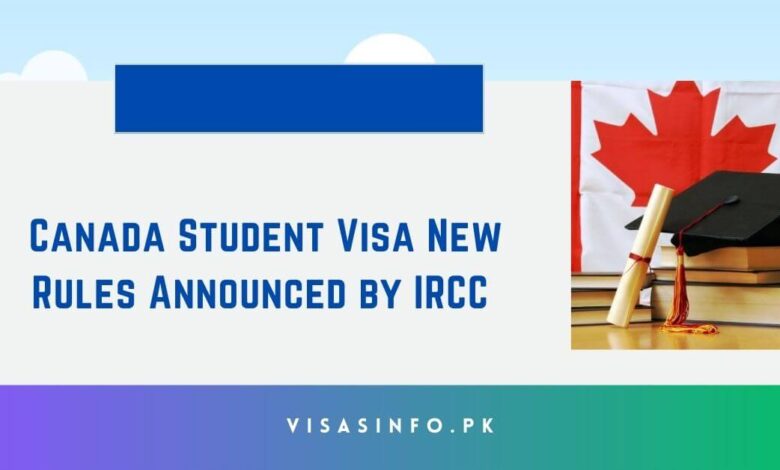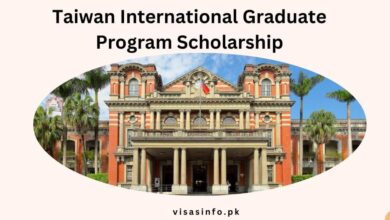Canada Student Visa New Rules Announced by IRCC 2024

Canada has recently implemented a series of innovative regulations that will apply to international students beginning in 2024. The educational experience for students in the nation will be redefined with the implementation of these regulations, marking a new chapter in Canada’s commitment to fostering an inclusive and diverse learning environment.
International students and stakeholders alike have the opportunity to acquire critical insights into the evolution of Canadian education by analyzing the subtleties of these new regulations.
Are you planning to enroll as a foreign student in Canada soon? There are certain fundamental laws and regulations that all international students must be aware of as the globe of possibility expands for you. The objective of the new regulations for foreign students in Canada is to improve their educational experience, rather than to restrict it. They are in place to ensure that your time studying and interacting with Canadian culture is seamless and to prepare you for success during your stay.
New Rules for International Students in Canada 2024
1. Increase in Cost of Living
There is an additional cost of the living requirement of $2,635 for all applicants who submit their applications on or after January 1, 2024, in addition to the first year’s tuition and travel fees for study permits in Canada.. Furthermore, the necessary living expenses are magnified by the number of family members who accompany an international student.
This was previously set at $10,000 in the early 2000s and has never been raised, which has made it challenging for international students to cover their basic requirements.
2. Cap on the Number of International Students Coming to Canada
It is imperative to emphasize that Canada has restricted the number of visas it will issue to international students, even though this information is widely recognized. Canada will issue only 360,000 new study permits this year as a result of a 35% decrease in the number of permits. The country will not recognize any permits that exceed 66.6% in 2024.
Therefore, before applying, ensure that you are cognizant of the limit on the number of international students in Canada who are eligible to file for new study permits or extensions from within the country. Applications for a study permit to enlist in a graduate program at the Master’s or doctorate level or to study at the primary or secondary school level C
3. New Provincial Attestation Letter (PAL) Requirement
A Provincial Attestation Letter (PAL) from the province or territory where the applicant intends to study is required for the majority of new study permit applications. These applications must be submitted in Toronto after 8:30 a.m. EST on January 22, 2024. Procedures for the issuance of provincial or territorial PALs have not yet been established. The federal government aspires to institute the PAL procedure by March 31, 2024.
Exclusivity
If you are applying, the PAL requirement does not apply to new study permit applications;
- To complete grade 12 coursework in a preschool, elementary school, or high school
- Pursuing graduate or master’s level coursework
- To extend a study permit from Canada
4. Spouse Open Work Permit Eligibility Change
In the following weeks, spouses of foreign students who are pursuing master’s and doctoral degrees will be granted open work permits. The eligibility of spouses of international students who are enrolled in undergraduate and graduate programs will be discontinued.
Master’s, doctoral, and professional degree-granting graduate students, as well as their spouses and common-law partners, are the sole individuals eligible for an open work visa.
Spouses and common-law partners of international students who wish to extend their current work visas will remain eligible under this stream after these modifications are implemented. Spouses and common-law partners of international students who are enrolled in undergraduate and graduate programs at other educational levels will no longer be eligible for an open work permit unless they currently hold one under this stream.
5. Changes to Post-Graduation Work Permit (PGWP) Eligibility
Anyone who completes a master’s program in less than two years and meets all other PGWP eligibility requirements as of February 15, 2024, will be eligible for a three-year post-graduation work permit. The PGWP duration will correspond with the study program duration for programs other than master’s degrees, with a maximum of three years.
Who Qualifies for a Longer Post-Graduate Work Permit (PGWP)
A three-year PGWP is available to graduates of master’s degree programs that last less than two years, as well as graduates of at least two-year programs and PGWP-qualifying accredited learning institutions. In addition, foreign students who enroll in courses under Curriculum Licensing Arrangements will no longer be eligible for a postgraduate work permit upon graduation, effective September 1, 2024.
Who is Eligible for a PGWP?
If international students who are currently enrolled in public-private partnership college programs meet additional program eligibility requirements after their studies have concluded, they will remain eligible for a PGWP.
Check Also: Canada To Approve Only 292,000 Study Permits
Benefits of Canada Student Visa New Rules Announced by IRCC
- Improved Processing Times: The revised visa regulations are designed to shorten the processing time for study permits, enabling students to commence their studies on schedule and receive their visas more promptly.
- Increased Work Hours: The new regulations may enable students to work additional hours off-campus while pursuing their studies, thereby granting them more valuable work experience and financial stability in Canada.
- Pathway to Permanent Residency: The new regulations may establish more transparent and accessible pathways for students to transition from a study permit to permanent residency, thereby increasing the appeal of Canada as a destination for individuals seeking to establish a future in the country.
- Enhanced Post-Graduation: Work Permit (PGWP) Program: The modifications may enhance the PGWP program by simplifying the eligibility criteria or providing extended work permits, thereby allowing graduates to acquire work experience in their field of study.
- Regional Study Support: The new regulations may serve to motivate students to pursue their education in regional regions by providing incentives such as enhanced immigration points or simplified access to permanent residency, which would be advantageous to both students and regional communities.
- Recognition of Online Studies: The COVID-19 pandemic may result in the continued recognition of online studies for PGWP eligibility, providing students who began their education remotely with flexibility.
- Streamlined Application Process: The IRCC may implement a more user-friendly and efficient application process, which would simplify the process of applying for visas for students and alleviate administrative demands.
- Health and Safety Benefits: The new regulations may include improved health and safety measures for international students, guaranteeing that they have access to healthcare and support services while studying in Canada.
Who is Not Eligible for a PGWP
New students who enroll in public-private partnership college programs will not be eligible for a post-graduation employment visa upon completion of their degree.
The introduction of these new regulations represents a dedication to academic performance and the provision of an engaging experience for international students studying in Canada. As we navigate these transitions, the nation remains steadfast in its commitment to establishing a welcoming environment for Global Learners.
These laws present promising opportunities for international students who wish to commence their academic pursuits in the dynamic and diverse Canadian academic system.
Frequently Asked Questions:
-
Are there any new rules for student visas in Canada?
According to Marc Miller, Canada’s Immigration Minister, the country will only approve 364,000 new study permits starting in 2024.
-
What’s the latest update on the Canadian student visa?
Most students must provide a provincial attestation letter (PAL) from the province or territory where they plan to study by January 22, 2024. Some exceptions apply. Find out more. Before you arrive in Canada, you must apply for and receive approval for a study permit.
-
What are the new changes in the IRCC?
In 2022–23, the IRCC introduced a temporary measure to provide access to open work permits for families (spouses and dependents) of temporary foreign workers in Canada. This new measure currently applies to workers under the Temporary Foreign Worker Program and the International Mobility Program.



